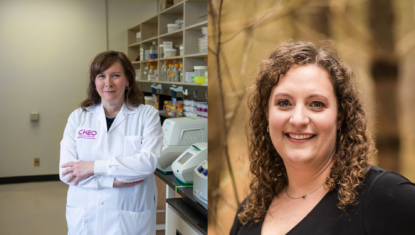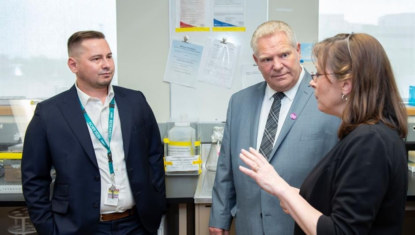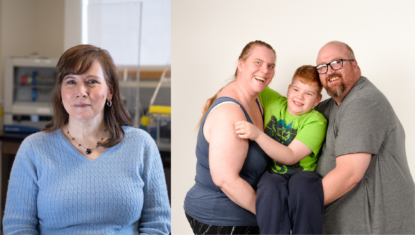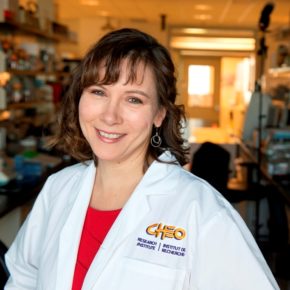Kym Boycott is a Professor of Pediatrics at the University of Ottawa in Canada, where she is a Clinical Geneticist at the Children’s Hospital of Eastern Ontario (CHEO), Chair of the Department of Genetics, and a Senior Scientist at the CHEO Research Institute. Dr. Boycott is a Tier 1 Canada Research Chair in Rare Disease Precision Health whose research program bridges clinical genomics to basic research and is focused on understanding the molecular pathogenesis of rare diseases to improve patient care and family well-being. She leads the national Care4Rare Canada Consortium integrating genomic and other –omic technologies to improve our understanding of rare disease, with a particular focus on solving the unsolved and most difficult rare diseases. To leverage these discoveries, she co-leads the Canadian Rare Diseases: Models & Mechanisms Network, established to catalyze connections between newly discovered rare disease genes and basic scientists who can rapidly study them in model systems. Globally, she moves the rare disease agenda forward as part of the Global Commission to End the Diagnostic Odyssey for Children.
Related News
-

05/03/2025
CHEO Research Institute to help position Canada as global leader in precision health through genomic data generation
-

13/11/2024
CHEO Hopes to Share World-First AI Algorithm to Diagnose Rare Disease
-

23/05/2024
World-first AI algorithm developed at CHEO leads to rare disease diagnosis for families
Research Projects
-
Evaluation of the diagnostic accuracy of exome sequencing and its impact on diagnostic thinking for patients with rare disease in a publicly funded health care system: A prospective cohort study
26/02/2024
The introduction of genomic technologies, such as exome sequencing (ES), has created an opportunity to shorten the uncertain and emotionally taxing “diagnostic odyssey” experienced by families with suspected rare genetic diseases (RGDs).1, 2, 3 A meta-analysis has demonstrated a diagnostic yield of 36% for both clinical and research-based ES in the context of a broad range of RGD indications.4 However, studies have typically been retrospective analyses on convenience samples of patients or large cohorts with unspecified phenotypes reported by diagnostic laboratories. Despite few randomized-controlled trials, systematic reviews, and health technology assessments, health care systems in various jurisdictions have moved to implement ES as a clinical test.5 How jurisdictions optimize this test’s implementation will depend on their health care system and context. However, sharing empirical evidence of the utility of this test and policy processes that support its use can guide health care systems in these implementation efforts.6
-
Exome and genome sequencing for rare genetic disease diagnosis: A scoping review and critical appraisal of clinical guidance documents produced by genetics professional organizations
01/11/2023
Over the past 12 years, exome sequencing and genome sequencing (ES/GS) technologies have transitioned from a research method used to identify new etiologies of rare genetic diseases (RGDs)1 to an implemented diagnostic test available to millions of patients with suspected RGDs and more common disorders through health care systems around the world (Birney E, Vamathevan J, Goodhand P. Genomics in healthcare: GA4GH looks to 2022. bioRxiv. 2017. https://doi.org/10.1101/203554). These technologies have produced a paradigm shift in the field of medical genetics, ushering in an era of genomic discovery and providing an opportunity to shorten long diagnostic odysseys in the clinic.2,3 This rapid pace of translation from research to clinical practice is unique among applications of genomic technologies related to precision medicine4 and has resulted in a significant challenge for health care system decision makers, including clinicians and payers, responsible for developing optimal, evidence-based clinical approaches using ES/GS testing in the context of a naive and rapidly evolving evidence base. Genetics health care professionals, including medical geneticists, laboratory geneticists, and genetic counselors, have been at the forefront of this challenge, tasked with identifying which families might benefit from ES/GS, running these tests, deciding what might be reported back to families (including findings unrelated to the primary indication for testing, hereon referred to as additional findings), and contextualizing these results. To support responsible and consistent practice among health care professionals within their membership, several organizations have generated guidance documents regarding the clinical implementation of ES/GS.
-
Bridging clinical care and research in Ontario, Canada: Maximizing diagnoses from reanalysis of clinical exome sequencing data
01/03/2023
-
Outcome of over 1500 matches through the Matchmaker Exchange for rare disease gene discovery: The 2-year experience of Care4Rare Canada
01/01/2022
Matchmaking through the MME is an effective way to investigate novel candidate genes; however, it is a labor-intensive process. Engagement from the community to contribute phenotypic, genotypic, and inheritance data will ensure that matchmaking continues to be a useful approach in the future.
-
PLPHP deficiency: clinical, genetic, biochemical, and mechanistic insights
01/03/2019
The vitamin B6-responsive disorders (B6RDs) are a clinically and genetically heterogeneous group of rare, autosomal recessive conditions (Clayton, 2006) with the hallmark feature of seizures uniquely responsive to treatment by the B6 vitamers pyridoxine and/or pyridoxal-5′-phosphate (PLP) (Baumgartner-Sigl et al., 2007; Basura et al., 2009). PLP is a cofactor for over 160 distinct catalytic functions (Percudani and Peracchi, 2009), including enzymes involved in glucose, lipid and amino acid metabolism (John, 1995; Percudani and Peracchi, 2003; Eliot and Kirsch, 2004), and for the synthesis of neurotransmitters, making it an essential vitamer for normal brain function (Surtees et al., 2006).

